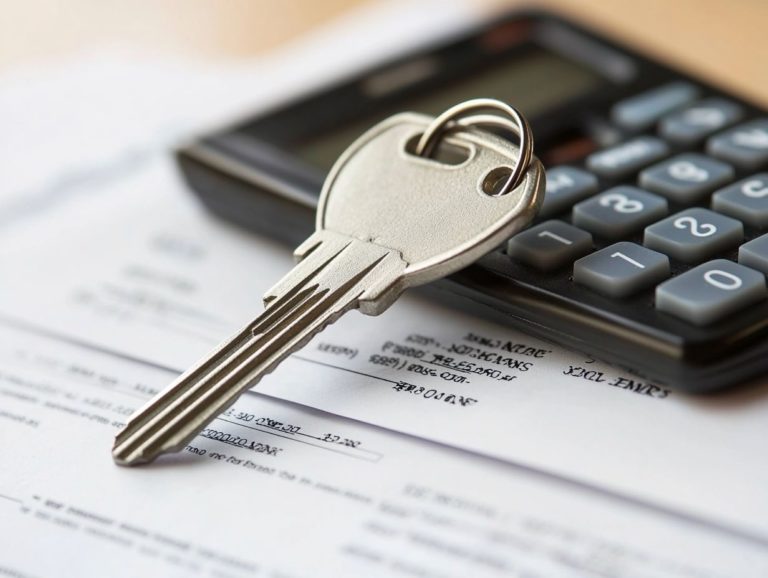5 Factors to Consider Before Refinancing
Refinancing your mortgage can be a savvy decision, but it s not one to make without careful thought.
With interest rates shifting and financial goals evolving, it’s important to understand the details. This article delves into five pivotal factors to consider before refinancing, including the impact of your credit score and how long you plan to stay in your home.
By the end, you ll have a clearer understanding of whether refinancing fits seamlessly into your financial strategy.
Contents
- Key Takeaways:
- 1. Current Interest Rates and Your Credit Score
- 2. Your Financial Goals and Objectives
- 3. The Length of Time You Plan to Stay in Your Home
- 4. The Cost of Refinancing
- 5. Potential Risks and Benefits of Refinancing
- What Is Refinancing and How Does It Work?
- Frequently Asked Questions
- What are the 5 factors to consider before refinancing?
- How does my current interest rate affect my decision to refinance?
- Why are closing costs important to consider when refinancing?
- How does my credit score affect my ability to refinance?
- Why is home equity an important factor to consider before refinancing?
- What should I consider in terms of my financial goals before refinancing?
Key Takeaways:

- Check current interest rates and your credit score to find the best deal.
- Identify your financial goals before refinancing for better outcomes.
- Consider how long you’ll stay in your home it will affect your refinancing benefits.
1. Current Interest Rates and Your Credit Score
Understanding the relationship between current interest rates and your credit score is essential for homeowners contemplating refinancing. Interest rates can dramatically affect your monthly mortgage payments.
A higher credit score can qualify you for lower refinancing costs, ultimately shaping your overall financial landscape. Recent reports indicate that interest rates are hovering between 3.5% and 4.5%.
Even a minor fluctuation can translate to hundreds of dollars in savings or costs over the life of your loan. Aiming for a credit score of at least 700 is wise; individuals with scores above this benchmark typically benefit from significantly better mortgage terms.
To enhance your credit score, consider these strategies:
- Pay down existing debts.
- Ensure your bills are paid on time.
- Regularly review your credit reports for errors.
A 20-point increase in your credit score could save you about 0.25% on your refinancing interest rate, highlighting the value of financial diligence in your homeownership journey.
2. Your Financial Goals and Objectives
Knowing your financial goals is a game changer when it comes to refinancing. It lays the groundwork for determining whether refinancing aligns with your unique financial circumstances.
Whether you want to consolidate high-interest debt, fund home improvements, or save on monthly mortgage payments, a clear understanding of your goals will help evaluate refinancing options.
As a homeowner, you often juggle various financial priorities, such as saving for retirement or investing in upgrades. Each ambition shapes your approach to refinancing.
If you aim to improve your current home, a cash-out refinance allows you to take money out of your home equity while getting a new mortgage. If you re focused on retirement, lowering your monthly obligations can boost your savings.
Understanding how these goals interact can significantly influence your financial decisions and contribute to your long-term economic well-being.
3. The Length of Time You Plan to Stay in Your Home
The length of time you plan to stay in your home is a crucial factor to consider when refinancing your mortgage. It directly affects whether the investment is worthwhile. Calculate your breakeven point between refinancing costs and potential savings to make an informed choice.
If you plan to stay long enough to recoup the refinancing costs, exploring lower interest rates and better loan terms may be beneficial. However, if a move is on the horizon, refinancing might not be the best route.
To pinpoint that breakeven point effectively, assess all costs associated with refinancing, including application fees, appraisal costs, and closing costs. Compare these against your potential monthly savings for a clearer picture.
A thorough analysis of your breakeven timeline helps you understand if long-term savings will outweigh the initial costs. For those considering a long-term residence, significant savings can accumulate, making refinancing a smart move.
If you re anticipating a job transfer or relocation within the next few years, the costs may outweigh the benefits. Align your refinancing decisions with your future plans.
4. The Cost of Refinancing

When considering refinancing, it s crucial to know all the costs upfront to maximize your savings. Refinancing costs can significantly influence your overall savings and financial strategy.
The costs often include a fee to process your new loan and other closing costs that can add up quickly, impacting your financial situation.
Understand all fees related to refinancing to ensure the savings are worth the investment. These costs frequently include appraisal fees, which assess your property’s current value, as well as private mortgage insurance (PMI), needed when your down payment is less than 20%.
If you decide to roll these costs into the loan amount, it could lead to higher monthly payments, ultimately eating into your potential savings.
Using strategies such as shopping around for lower closing costs and negotiating fees can help you reduce some of these expenses. Consider a no-closing-cost refinance as another option.
Grasping the full picture of these costs is essential for anyone looking to maximize their financial advantages.
5. Potential Risks and Benefits of Refinancing
Refinancing presents both potential risks and benefits, making it essential to evaluate these aspects carefully in the context of your unique financial situation.
On one hand, refinancing can lower your monthly mortgage payments and provide an opportunity to consolidate high-interest debt. On the other hand, if not managed carefully, it could lead to higher overall costs. Consulting a financial advisor can offer valuable insights into the pros and cons of refinancing based on your personal financial circumstances.
For example, if you refinance from a 30-year loan at 4.5% to a new 15-year loan at 3%, you could save significantly on interest over time while building equity faster.
However, extending your loan term back to 30 years might lower your monthly payments but could cost you thousands in additional interest over the long term.
It’s equally important to consider the closing costs associated with refinancing, as these could offset your initial savings and complicate your decision-making process. Real-life success stories from those who have navigated refinancing effectively can serve as invaluable guides on your journey.
What Is Refinancing and How Does It Work?
Refinancing lets you replace your current mortgage with a new loan. This often comes with better terms, like lower interest rates or a different loan duration.
This move can lower your monthly payments, help you access home equity for renovations, or consolidate high-interest debt.
Understanding the refinancing process is essential for making informed decisions. Before proceeding, evaluate current interest rates and your credit score.
Your financial situation will help you decide if refinancing aligns with your long-term goals, whether that’s lowering expenses or preparing for major purchases.
The refinancing process involves applying for a new loan and reviewing costs like closing fees. This journey optimizes your payments and secures a more stable financial future.
What Are the Different Types of Refinancing?
You have various refinancing options tailored to fit your financial needs. From conventional refinancing to government programs, knowing these choices empowers you to make strategic decisions.
Whether you want to adjust your loan term or take advantage of government offerings, knowledge is your ally.
Rate-and-term refinancing is popular for lowering payments or shortening loan durations. Cash-out refinancing allows you to access home equity for improvements or debt consolidation.
Government programs, like FHA and VA loans, cater to first-time buyers and veterans with favorable terms. Assess your credit and long-term goals to find the best refinancing option for you.
What Are the Steps Involved in Refinancing?

The refinancing process has key steps you must follow to replace your mortgage successfully.
Start by preparing your refinance application and gathering necessary documents. Understanding each step ensures a smooth transition and optimizes your savings.
Your journey begins with getting pre-approved. This shows how much you can borrow and at what rate.
Next, collect documentation like income statements and tax returns. This helps lenders assess your financial stability.
Once pre-approval is secured, an appraisal will determine your property’s value. Watch for hidden fees or the temptation to over-borrow.
By staying organized and proactive, you can make the refinancing process less stressful and more efficient.
How Can a Homeowner Determine If Refinancing Is Right for Them?
To decide if refinancing is right for you, evaluate your personal finances and the current mortgage rates. Assess your credit score, debt-to-income ratio, and potential savings against the costs of refinancing.
Don’t overlook market conditions like interest trends and local real estate dynamics. Online calculators can help you project payments and savings.
By analyzing these factors, you can better understand whether refinancing fits your financial strategy, especially with future life changes in mind.
What Are the Common Mistakes to Avoid When Refinancing?
When you decide to refinance, it s crucial to steer clear of common mistakes that could lead to less-than-ideal outcomes. Overlooking refinancing costs or neglecting to shop around for the best loan terms can seriously impact your finances.
Engaging a money expert can really help you avoid mistakes, guiding you through these pitfalls and ensuring your choices align with your financial goals without unnecessary fees.
It’s easy to get caught up in the allure of low interest rates. However, it s essential to consider other factors like loan terms, potential penalties, and the overall repayment timeline. Not understanding these details can lead to missed opportunities for savings that could make a significant difference.
Prioritize thorough research by examining multiple lenders. Gain a solid understanding of the refinancing landscape. Seeking professional advice clarifies your loan options and reveals potential savings, guiding you toward smarter financial decisions that set you up for success.
What Are the Long-Term Effects of Refinancing?
Refinancing can have profound long-term effects on your financial landscape, shaping your circumstances for years to come, both positively and negatively.
While you might experience lower monthly payments and reduced interest costs initially, it s essential to consider how extending the loan term or incurring additional costs can impact your overall financial health in the long run.
For example, if you refinance to take advantage of a lower interest rate, you may find immediate relief in your budget. However, there are potential downsides, such as resetting the clock on your loan repayment, which could lead to paying more in interest over time.
Take, for instance, a family that refinanced their mortgage; they saved hundreds each month initially but ultimately faced higher overall repayments due to an extended loan term. This situation underscores the importance of strategic planning.
By thoroughly understanding your financial situation, evaluating potential risks, and considering future needs, you can make informed decisions that profoundly influence the outcome of your refinancing journey.
Frequently Asked Questions

What are the 5 factors to consider before refinancing?
The five factors to consider before refinancing are your current interest rate, closing costs, credit score, home equity, and financial goals.
How does my current interest rate affect my decision to refinance?
Your current interest rate is important because it determines the potential savings you could achieve by refinancing. If your rate is significantly higher than the market rate, refinancing could save you money in the long run.
Why are closing costs important to consider when refinancing?
Closing costs can add up quickly and significantly impact the overall cost of refinancing. It’s important to factor in these costs and ensure the potential savings from refinancing outweigh them.
How does my credit score affect my ability to refinance?
Your credit score is a major factor in determining your eligibility for refinancing and the interest rate you qualify for. Lenders typically look for a credit score of 620 or higher.
Why is home equity an important factor to consider before refinancing?
Having a good amount of home equity can help you qualify for better refinancing options and potentially lower interest rates. It also protects you from becoming underwater on your mortgage if property values decrease.
What should I consider in terms of my financial goals before refinancing?
Before refinancing, it’s important to clearly understand your financial goals. Are you looking to lower your monthly payments, pay off your mortgage faster, or access cash for renovations? Knowing your goals will help you determine if refinancing is the right choice for you.
Ready to explore your refinancing options? Act now to save money!




